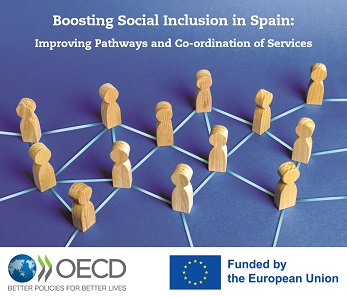Spain

Boosting Social Inclusion in Spain
Improving Pathways and Co-ordination of Services
 Spain has a high share of the working age population at risk of poverty or social
exclusion and a high incidence of child poverty. While Spain has introduced a minimum
income at the national level, social inclusion policies are the responsibility of
the regions. At present, the coverage of the minimum income remains low and there
are many differences in the design and implementation of social inclusion policies
across regions, especially as a number of regions do not develop social inclusion
strategies. There is also a lack of a multidimensional approach to social inclusion.
This report develops options for new inclusion models that address current challenges
and help formulate a coherent inclusion strategy. It also sets out a blueprint for
developing a monitoring and evaluation framework. The recommendations aim to increase
the effectiveness of minimum income policies and strengthen the co-ordination between
social services, employment, health and housing.
Spain has a high share of the working age population at risk of poverty or social
exclusion and a high incidence of child poverty. While Spain has introduced a minimum
income at the national level, social inclusion policies are the responsibility of
the regions. At present, the coverage of the minimum income remains low and there
are many differences in the design and implementation of social inclusion policies
across regions, especially as a number of regions do not develop social inclusion
strategies. There is also a lack of a multidimensional approach to social inclusion.
This report develops options for new inclusion models that address current challenges
and help formulate a coherent inclusion strategy. It also sets out a blueprint for
developing a monitoring and evaluation framework. The recommendations aim to increase
the effectiveness of minimum income policies and strengthen the co-ordination between
social services, employment, health and housing.
Published on September 29, 2023
TABLE OF CONTENTS
| Foreword | |
| Executive summary | |
| Main characteristics of socially excluded in Spain | |
| Policy responses to social inclusion barriers in Spain | |
| Minimum income schemes and inclusion itineraries in Spain | |
| Best practices in social inclusion across OECD countries: Ensuring adequate monetary support, active inclusion and co‑ordinated services | |
| An improved monitoring and evaluation framework for social inclusion in Spain | |
| Policy directions: Avenues for the future of social inclusion in Spain |
Powered by OECD iLibrary

 Follow us on X (ex-Twitter) via
Follow us on X (ex-Twitter) via